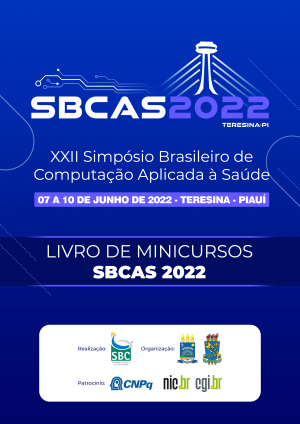Short Courses of the 22nd Brazilian Symposium on Computing Applied to Health
Keywords:
SBCAS 2022, SBCAS 2022 short-courses, Computing Applied to HealthSynopsis
The SBCAS 2022 book of courses addresses topics of interest to the Health Informatics community. The topics range from phenotypes in observational research, through IoT and Modeling with a focus on patients, to Multisensory Therapies, Technologies for healthcare delivery, and ending with applications of COVID-19 classification in images.
The first chapter, called "Internet of Health Things: applying IoT, interoperability and machine learning with a patient focus" presents the theory and evolution of healthcare systems, to at the end discuss possible solutions for developing a distributed model for information interoperability.
The chapter "Socially Assistive Robots: Developing Multisensory Therapy Sessions with the EVA Robot" presents the theory of Socially Assistive Robots and describes the architecture (hardware and software) of the EVA robot which is an open-source platform for therapies for Alzheimer's patients and for children with Autistic Spectrum Disorder.
In the third chapter entitled "Modeling, Mining and Analysis of Patient Journeys/Trajectories" are presented data mining techniques appllied in the sequence of care and procedures performed by the patient, thus a new field of research is showed.
The chapter "Classification and Segmentation of COVID-19 in Computed Tomography Images Using Deep Learning" presents techniques to aid the diagnosis of COVID-19 for CT scans.
The penultimate chapter "Mystrengths+Myhealth System (MSMH): Assistive Technology for Healthcare Delivery" is about the concept of whole-person health which has many elements, and the integration of these elements in healthcare delivery is necessary.
Finally, the last chapter "Phenotypes in the context of observational research: OHDSI Phenotype Phebruary 2022" shows that phenotypes are the fundamental elements of analyses and the link with standardized model data, presenting the result of the creation of a collaborative network, its concepts, influence in the generation of cohorts and validation of results.
Chapters
-
1. Internet das Coisas de Saúde: aplicando IoT, interoperabilidade e aprendizado de máquina com foco no paciente
-
2. Robôs Socialmente Assistivos: Desenvolvendo Sessões de Terapia Multissensorial com o Robô EVA
-
3. Modelagem, Mineração e Análise de Jornadas / Trajetórias de Pacientes
-
4. Classificação e Segmentação de COVID-19 em Imagens de Tomografia Computadorizada Usando Aprendizado Profundo
-
5. Sistema Mystrengths+Myhealth (MSMH): Tecnologia auxiliar para prestação de cuidados de saúde
-
6. Fenótipos no contexto da pesquisa observacional: OHDSI Phenotype Phebruary 2022
Downloads



